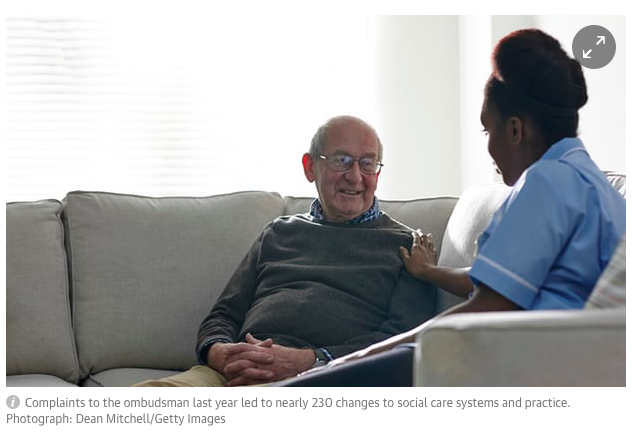Small changes can make a big difference to the quality of care
 It t takes courage for someone to raise concerns about their care. Less obvious is the bravery and humility it takes to listen with an open mind to complaints when you are on the receiving end – but for those who do there is real evidence it can have a big impact on improving the quality of services.
It t takes courage for someone to raise concerns about their care. Less obvious is the bravery and humility it takes to listen with an open mind to complaints when you are on the receiving end – but for those who do there is real evidence it can have a big impact on improving the quality of services.
Our latest annual review of social care complaints proves this point. Last year our investigations resulted in more than 1,300 recommendations to put things right, 11% more than the previous year. Despite the extreme challenges faced by the sector, I’m heartened that in all but one case councils and care providers reacted positively and made practical changes.
That demonstrates the mature attitude displayed by many staff and managers in acknowledging fault, remedying suffering and using complaints to bring about positive change. Last year this led to nearly 230 changes to systems and practice. These are often simple, sensible steps on the frontline, such as training staff in the use of bed rails, keeping an inventory of people’s possessions or giving clear written explanations of fees and charges. These small changes make a big difference.
We have the power to extend the scope of our investigations into an individual case if we suspect that other people have suffered an injustice. In these circumstances, a single concern can benefit many people.
In one example, a couple complained about their respite care being halved to four weeks without a proper needs assessment. As full-time carers of an adult relative with learning disabilities, this change had a huge detrimental impact on their lives. When we investigated, we found the council had imposed a blanket policy on all carers to restrict respite support as part of a wider aim to reduce costs.
Following our intervention, the council not only agreed to reinstate the couple’s respite provision, but also agreed to look at everyone else affected. Because of this one complaint, cuts were reversed for 69 other families and the policy was changed.
Positive outcomes like this rely on managers and care workers engaging constructively. Strong leadership is essential to foster how to learn from complaints and empower those on the frontline to respond quickly and with confidence to concerns, but nothing replaces the role of care workers who can help encourage people to talk about their experiences. If someone feels their concerns will be acted on and valued, they are more likely to come forward.
In 2016-17 the number of complaints we received about independent care providers continued the upward trend we have seen for the last seven years. I welcome it as a sign of a greater openness and accountability and want to thank everyone who has responded to our calls to make complaint processes more visible and who are letting people know about their right to go to the ombudsman. I would urge others to do so.
Of greater concern is the number of complaints we uphold. Last year we found faults in nearly two thirds of the adult social care investigations we carried out, the highest level of problems we find in any aspect of our work. Given the well-documented challenges, that might not be a surprise.
At a time of unprecedented pressures on adult care, complaints need not be a burden. They can offer rapid and free feedback on how things are working, they can act as a cost-effective early warning of wider problems, and in an era when so much is measured by performance indicators and statistics, listening to people’s concerns brings a warmer, human lens through which we can better understand the real experiences of real people receiving care.
By: Michael King
Source: https://www.theguardian.com/









